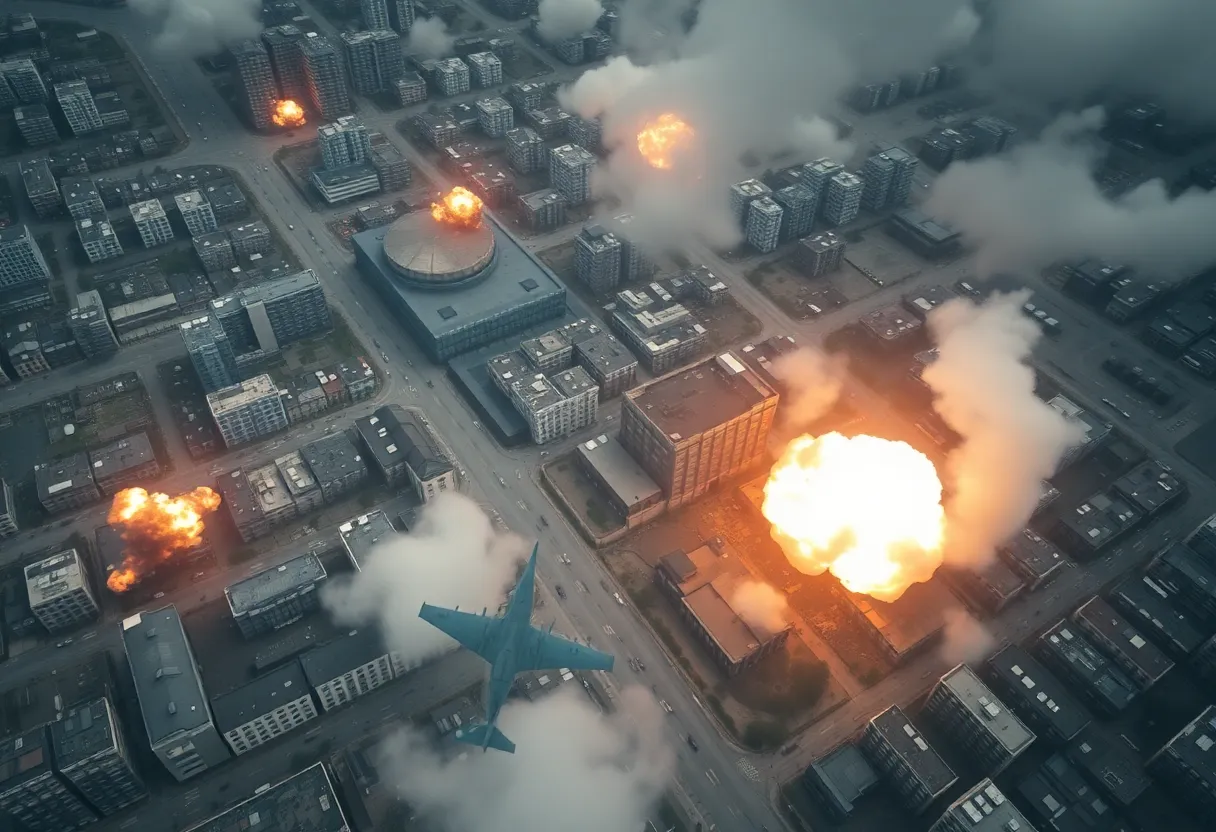News Summary
Tensions have reached a new high as the US and Israel launched airstrikes on multiple Iranian nuclear facilities, destroying critical targets in a surprise operation. Iran has retaliated with missile attacks, leading to a dire diplomatic climate and fears of escalating conflict. Global oil supply concerns are also heightening as the Strait of Hormuz becomes a point of contention. The repercussions of these military actions could have lasting impacts both regionally and internationally.
Escalating Military Actions Against Iran: A Tense New Chapter
Early on Sunday, the skies over Iran lit up as the **US**, alongside **Israel**, conducted a raid on three critical Iranian nuclear facilities. This surprise operation, termed **Operation Midnight Hammer**, was heralded by President Trump as a monumental success that “obliterated” vital nuclear sites.
The Details Behind the Operation
The United States employed B-2 stealth bombers that rained down massive **bunker-buster** bombs on the Fordow and Natanz facilities, two pivotal locations in Iran’s nuclear program. In addition, **Tomahawk missiles** targeted sites around Isfahan, highlighting the seriousness of the situation. The goal? To significantly cripple Iran’s ability to improve its nuclear capabilities.
A Growing Hostility
With tensions rising, Iran didn’t hold back in expressing its anger. During an emergency meeting of the **UN Security Council**, Iranian officials condemned the US and Israeli actions, and skepticism about the future of diplomacy was palpable. Meanwhile, there’s been a rollercoaster of back-and-forth exchanges between Iran and Israel, both of which have been engaging in military actions for over a week nonstop.
Threats of Escalation
While US officials were quick to reassure that they are not at war with Iran, Trump carefully hinted that further military actions could be on the table if peace remains elusive. He even floated the controversial idea of regime change in Iran. Just as a reminder, Israel also ramped up its airstrikes on Iranian military infrastructure, targeting sites in regions like **Kermanshah** and **Parchin**, which are critical for Iran’s military operations.
Iran’s Retaliation and the Ripple Effect
In retaliation, Iran fired a missile at Israel, but it was swiftly intercepted by Israeli air defenses. This deadly game of cat and mouse has drawn concern not just regionally but globally. There are now growing calls within Iran to close the **Strait of Hormuz**, a crucial waterway for global oil transport, which could have significant ramifications for international markets, particularly affecting nations like China that rely heavily on imported oil.
The Stakes for Global Oil
In fact, in 2025, nearly **5.4 million barrels** of crude daily were being imported through this vital strait by China alone. Trump, recognizing this reality, urged China to discourage any Iranian plans to shut down the strait. After all, a staggering **90% of Iran’s oil** exports head to China. Should Iran follow through on any closures, it could severely disrupt the global oil supply, sending prices soaring.
International Reactions and Domestic Responses
The airstrikes raised eyebrows worldwide, and China was quick to criticize the US military actions, arguing they add to the existing tensions rather than alleviate them. Though US allies have shown a degree of support for military engagement against Iran, many are still calling for a diplomatic approach to de-escalate the situation. Gulf nations, in particular, want cooler heads to prevail.
A Possible Shift in Iranian Nuclear Policy
Initial assessments suggest that the US airstrikes caused significant damage to Iran’s nuclear capabilities. Yet, the extent of this damage is still murky. Meanwhile, hard-line factions within Iran may seize this moment to push for more aggressive nuclear weapons development as a means of defense against perceived US aggression. Iranian officials are even hinting at potentially withdrawing from the **Near-Nuclear Non-Proliferation Treaty**, indicating a troubling shift that could heighten global tensions even further.
The Market Reaction
While the global oil market has remained relatively stable for the moment, fears of an Iranian retaliation led to a surge in oil futures, with Brent crude prices briefly exceeding **$80 per barrel** for the first time since January. This serves as a reminder that even localized conflicts can ripple out, creating larger concerns for the global economy.
Political Fallout and Protests
The political landscape in the US is not unaffected, as Senator Bernie Sanders has drawn parallels between the current situation and the disastrous Iraq War, cautioning against repeating history. Protests erupted in several US cities against military intervention in Iran, reflecting a significant portion of the American populace that is reluctant to escalate military conflicts further.
The Road Ahead
As the situation develops, all eyes are on **Supreme Leader Ayatollah Ali Khamenei** and how he chooses to respond amidst the turmoil. US and Israeli intelligence agencies are closely assessing the outcome of these recent strikes, and there remains a palpable tension as uncertainty looms about the path forward. Will peace be attainable, or are we on the brink of a wider conflict? Only time will tell, but for now, the world watches nervously.
Deeper Dive: News & Info About This Topic
- CNN: Israel-Iran Conflict Live Updates
- The New York Times: Israel-Iran News
- BBC: Live Updates on the Conflict
- Al Jazeera: Iran’s Response to US Actions
- NBC News: Live Blog on Iran-Israel Relations
- Wikipedia: Iran – Nuclear Program
- Google Search: Iran Nuclear Program June 2025
- Google Scholar: Iran Israel Conflict
- Encyclopedia Britannica: Iran
- Google News: US Iran Relations 2025

Author: STAFF HERE ORLANDO WRITER
ORLANDO STAFF WRITER The ORLANDO STAFF WRITER represents the experienced team at HEREOrlando.com, your go-to source for actionable local news and information in Orlando, Orange County, and beyond. Specializing in "news you can use," we cover essential topics like product reviews for personal and business needs, local business directories, politics, real estate trends, neighborhood insights, and state news affecting the area—with deep expertise drawn from years of dedicated reporting and strong community input, including local press releases and business updates. We deliver top reporting on high-value events such as Orlando International Fringe Theatre Festival, Megacon Orlando, and Central Florida Fair. Our coverage extends to key organizations like the Orlando Economic Partnership and Hispanic Chamber of Commerce Metro Orlando, plus leading businesses in leisure and hospitality that power the local economy such as Walt Disney World Resort, AdventHealth, and Universal Orlando. As part of the broader HERE network, including HEREJacksonville.com, HEREPetersburg.com, HERETallahassee.com, and HERETampa.com, we provide comprehensive, credible insights into Florida's dynamic landscape.




